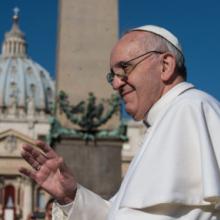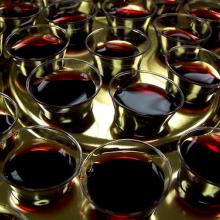lord's supper
While they were eating, Jesus took a loaf of bread, and after blessing it, he broke it, gave it to the disciples, and said, “Take, eat; this is my body.” Then he took a cup, and after giving thanks, he gave it to them, saying, “Drink from it, all of you; for this is my blood of the covenant, which is poured out for many for the forgiveness of sins.”
— Matthew 26:26-28
CLIMBING ROCK HILLSIDES and wading across gurgling streams lined with thistles, a friend and I walked the Jesus Trail in Galilee a few years ago. After about 8 miles of vigorous hiking each day, the trail led to a hostel or home with a hot meal we shared with other travelers. Our common identification with Jesus on this journey from Nazareth to Capernaum made these bread-breaking events seem to us almost like a “Lord’s Supper”! We were strangers from different countries, but our hunger and our common passion for walking where Jesus walked drew us together.
If eating together helps create a bond between diverse people, what compelled the Apostle Paul to write these words to his house churches in the city of Corinth: “Now in the following instructions I do not commend you, because when you come together, it is not for the better but for the worse.” (1 Corinthians 11:17)?
How does eating a bread cube and drinking a swallow of juice with other church members make things worse in the congregation? What divisions are keeping people apart from each other? Let’s dig into the context.
Pope Francis on Thursday washed the feet of 12 young inmates, including two girls and two Muslims, during a Maundy Thursday Mass at a youth detention center in Rome.
The Argentine pontiff, who has shown an eagerness to break with tradition in the two weeks since his election to the papacy on March 13, chose to celebrate the rite in the Casal del Marmo prison in northwest Rome, rather than in the traditional venue of the St. John Lateran Basilica.
Francis has repeatedly stated his desire to bring the papacy and the church closer to the poor and the marginalized.
I’m known for holding an alternative view on salvation than many Christians – even Disciples — maintain, in that I do not adhere to the doctrine that Jesus died for our sins. I know there are lots of scriptures to back this position, and one can also use scripture to justify other explanations for Jesus’ death. As many of us have seen, the Bible can be, and has been, used to justify nearly any position we care to use it to support. As for me, I’ve done years of searching, praying, discussing, and reading, and my conclusion is that it is the love of God as manifest by Jesus that is redemptive, and not Jesus’ blood.
I know some folks will likely stop here, discrediting anything else I have to say because of this perspective, which is unfortunate, but which I also understand. But a family member recently asked me about my take on communion if, in fact, I don’t ascribe to the idea that Jesus was saying “this is my body broken and my blood poured out for the remission of your sins.”


